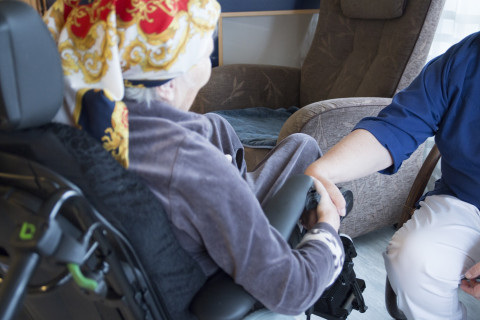Anna Mäki-Petäjä-Leinonen’s work at the University of Eastern Finland Law School is pioneering: no similar professorship exists in Finland nor abroad.
At the beginning of this June, Anna Mäki-Petäjä-Leinonen, Doctor of Laws, took up a permanent professorship in law and ageing at the University of Eastern Finland Law School. Her new role is unique, since no similar professorship exists in Finland nor, to the best of knowledge, anywhere else in the world.
“You could say that this work is pioneering. As far as I know, a professorship in law and ageing hasn’t been established anywhere else. Research into law and ageing is of course conducted also elsewhere, but often under another title,” Mäki-Petäjä-Leinonen says.
Mäki-Petäjä-Leinonen’s professorship in law and ageing is well-founded. She defended her dissertation on the legal status of persons with dementia at the University of Helsinki in 2003 and, in connection with her doctoral research in family law, she defined law and ageing as its own field of research. Since then, also other doctoral dissertations have been defended in the field.
“Everything I have done in research has more or less been related to older people.”
Research into law and ageing e has also become increasingly important internationally. For example, the European Law and Aging Network was founded in spring 2019, and around 50 scholars of law and ageing were involved in its establishment.
When we learn more about people’s experiences, we can try to influence the development of legislation in order for people to have as good a life as possible.
Anna Mäki-Petäjä-Leinonen
Professor of Law and Ageing

Self-determination act and the regulation of euthanasia stir up debate
As Professor of Law and Ageing, Mäki-Petäjä-Leinonen examines legal questions and problematic issues related especially to the elderly. People at the two extremes of the life span, i.e. children and older people whose functional capacity has deteriorated, belong to vulnerable groups.
“Children are just starting to reach their full functional capacity and, at the other extreme, older people’s functional capacity may be starting to deteriorate. Of course, the majority of older people retain their functional capacity until the end, but we know that memory disorders affect a large number of older people. Issues relating to vulnerability become topical at the end of the life span,” Mäki-Petäjä-Leinonen says.
In Finland, the field of law and ageing has traditionally relied on research into legal dogmatics, but now it is being taken more in a direction of empirical legal studies. Older people’s experiences of the realisation of their legal rights stands at the core of research.
“When we learn more about people’s experiences, we can try to influence the development of legislation in order for people to have as good a life as possible.”
Among the recent issues in law and ageing is the 2019 care crisis in Finland, which pertained to the activities and resources of enhanced service housing units. Issues relating to guardianship have also surfaced; in particular the question of how to take care of the personal affairs of an older person when they are no longer able to. By making an advance directive or drawing up continuing powers of attorney, one can influence how their affairs are handled in case of possible disability. This also supports the realisation of a disabled individual’s right to self-determination.
One topical issue is the drafting of a self-determination act, which has been resumed in the Ministry of Social Affairs and Health. Two earlier attempts to pass the bill have failed during the previous governments. According to Mäki-Petäjä-Leinonen, it is important that the ministry is readdressing the matter. Research-based knowledge on how measures restricting an individual’s freedom have had to be used in social welfare and health care services is available as background to support the drafting of the bill.
Mäki-Petäjä-Leinonen is also involved in a working group of the Ministry of Social Affairs and Health which examines the regulatory needs for end-of-life care and euthanasia.
“We are very much in agreement on palliative care and end-of-life care, but issues relating to euthanasia divide opinions. They involve ethical questions and questions related to individuals' world views. We are dealing with very sensitive issues there.”
Multidisciplinary research networks play an important role
Anna Mäki-Petäjä-Leinonen was involved in the establishment of the Institute of Law and Welfare at the Law School in 2018. The institute brings together researchers interested in studying welfare and the legal status and legal protection of people in vulnerable groups.
Researchers from the Institute of Law and Welfare participate in two of the multidisciplinary Research Communities of the University of Eastern Finland. The Neuroethics and Law Research Team led by Mäki-Petäjä-Leinonen is part of the Neuroscience Research Community (NEURO), which investigates issues related to neurodegenerative diseases and epilepsy from new perspectives, and which combines biological neuroscience expertise with data science, neuroinnovations, and responsible patient-oriented research. The Effectiveness of Social and Health Services Research Community, on the other hand, generates knowledge on the effectiveness and cost-effectiveness of social welfare and health care services, and on the promotion of health and well-being.
“Multidisciplinary collaboration is very important to us. For example, the Neuroscience Research Community clearly shares an ambition to examine the issues affecting people with dementia and epilepsy more comprehensively than before.”
Next, Mäki-Petäjä-Leinonen’s team will develop co-research together with the Neuro-Impact and Innovation Research Team led by Professor Päivi Eriksson. Older people, people with dementia, and their family members will have the opportunity to contribute to research at all of its stages.
“We follow a research philosophy which accepts that many people with dementia and others with reduced functional capacity are able to represent themselves or to speak for those who are no longer able to. Older people, people with dementia, their family members, and interest organisations will be involved in planning and conducting research, and in promoting their rights,” Mäki-Petäjä-Leinonen emphasises.
Anna Mäki-Petäjä-Leinonen
- Professor of Law and Ageing, University of Eastern Finland, 1 June 2021–
- Doctor of Laws, University of Helsinki, 2003
- Title of Docent in Law and Ageing, University of Lapland, 2014
- Title of Docent in Family Law, University of Helsinki, 2012
Key roles
- University Lecturer in Law and Ageing and Director of the Institute of Law and Welfare, University of Eastern Finland, 2018–2021
- Senior Researcher, University of Eastern Finland, 2016–2017
- University Lecturer, University of Helsinki, 2014–2015
- Researcher, University of Helsinki, 2010–2014
- Senior Legal Adviser, The Alzheimer Society of Finland, 2004-2009



